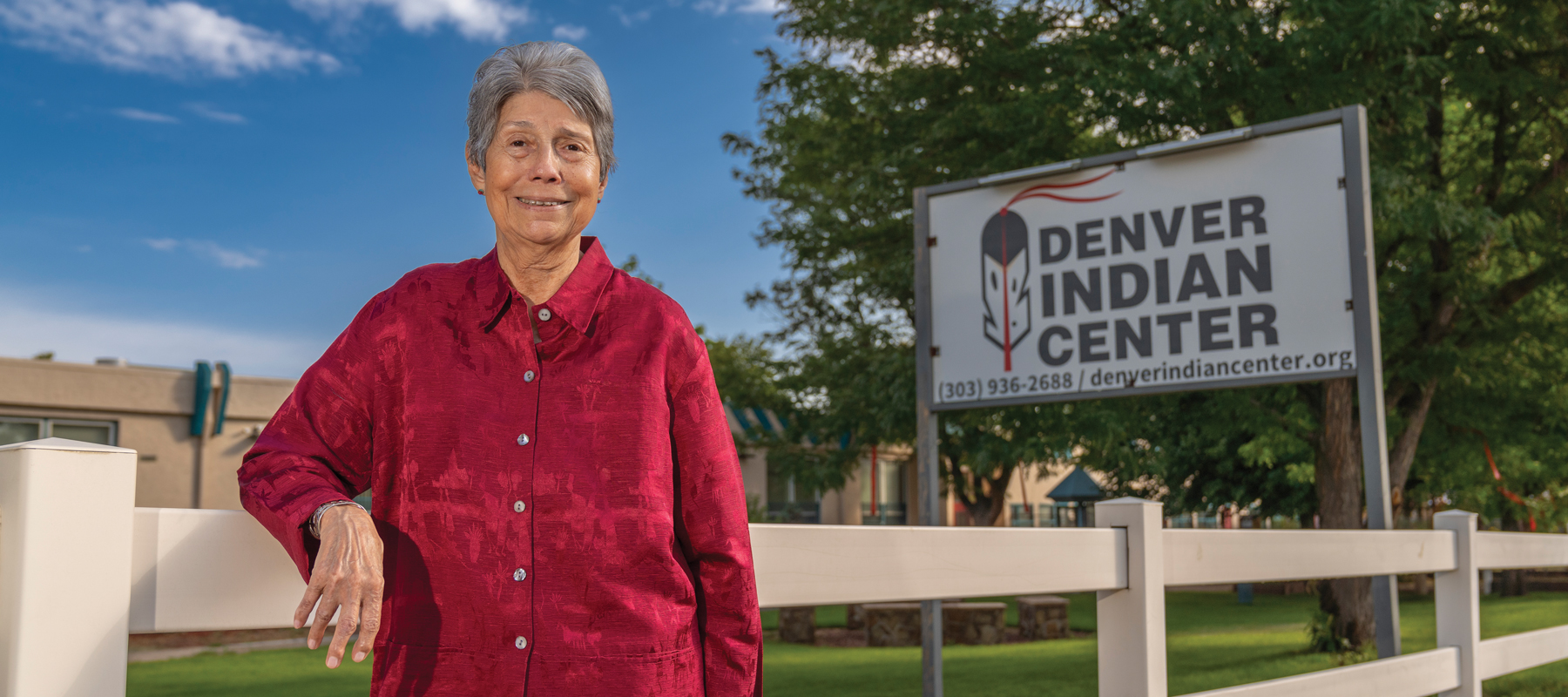
Changemaker: Lucille Echohawk
After more than 40 years of community service with Colorado’s Native American population, Lucille Echohawk continues to be optimistic about the future. “I was born a helping person,” she said. “My parents imbued in me and my siblings the importance of seizing opportunities and celebrating a glass half full, rather than half empty.”
 Lucille moved to Denver from Washington, D.C. in 1981 with a goal of putting down roots and deepening her experience in public policy by getting involved in community service with metro Denver’s Native community. Soon upon her arrival, she was asked not only to serve on the Board of Directors of Denver Native Americans United—the forerunner to what is now Denver Indian Center Inc.—but to lead the organization as its chairperson following the resignation of nearly all other board members. At the time, the organization was facing financial issues. “It was baptism by fire,” she said. “I had to step up and learn to lead the organization as best I could, with honesty about the issues while working with like-minded individuals to move the organization forward.”
Lucille moved to Denver from Washington, D.C. in 1981 with a goal of putting down roots and deepening her experience in public policy by getting involved in community service with metro Denver’s Native community. Soon upon her arrival, she was asked not only to serve on the Board of Directors of Denver Native Americans United—the forerunner to what is now Denver Indian Center Inc.—but to lead the organization as its chairperson following the resignation of nearly all other board members. At the time, the organization was facing financial issues. “It was baptism by fire,” she said. “I had to step up and learn to lead the organization as best I could, with honesty about the issues while working with like-minded individuals to move the organization forward.”
During her tenure as Chair, she was approached by a colleague with an opportunity to purchase and own the building that housed the organization. It involved constructing 48 housing units to serve elderly and disabled individuals. She worked with community partners and funders to bring this dream to fruition, which resulted in purchasing the building and surrounding property from the City and County of Denver for $5. Despite navigating the complexities of this project with limited staff, she said of the experience: “It was perfect.”
Lucille’s work with Denver’s Native community then began to focus on child welfare in 2000. This included co-founding the Denver Indian Family Resource Center (DIFRC) which focuses on strengthening Native families caught up in the public child welfare system or at risk of becoming involved in the system. In 2018, a colleague brought to her attention that many DIFRC client families were experiencing housing issues and thus could not be stable and healthy.
As a community leader, Lucille leaned into her strengths in building partnerships to lead efforts to form the Native American Housing Circle (NAHC), which in 2022 became the newest Native-led human service nonprofit in Denver. Together with a coalition of advocates, nonprofit organizations, and government agencies, NAHC works to improve housing for the Native American community in the greater Denver area, and address homelessness and housing instability.
My parents taught us to remember to turn around and help the next person in line.
As a principal founder and current Board Chair, NAHC has begun to build capacity to be responsive to the housing needs of Denver’s Native community. As it builds capacity, services currently include rental and security deposit assistance to prevent homelessness and working with families to address other barriers so that they may continue to stay housed. NAHC is also collaborating with CHFA, Mercy Housing, and the Denver Housing Authority, among others, on an affordable housing development which will also house a health clinic.
“NAHC is a collaborative effort because that’s what it takes for a successful community project,” explained Lucille.
 Lucille stressed the importance of relationship-building in her career and successes in advocating for the Native community. She is a lifelong collaborator who thrives at bringing people, organizations, and resources together for a common purpose: lifting up Colorado’s Native communities.
Lucille stressed the importance of relationship-building in her career and successes in advocating for the Native community. She is a lifelong collaborator who thrives at bringing people, organizations, and resources together for a common purpose: lifting up Colorado’s Native communities.
Lucille sees the many opportunities her career has afforded her as a privilege. “Every experience is a chance to learn more,” she said. “You file new information away accordingly and keep moving forward in as positive a way as you can.”
Now in her early eighties, she looks forward to building the capacity of NAHC so that it can have a wider impact and offer additional services for Native people and their housing needs. She is also focused on paving a path for the next generation. “My parents taught us to remember to turn around and help the next person in line.”
Though she doesn’t see herself as an expert in the mechanics of the housing industry, she has used her skills, knowledge and experience as a community leader to champion affordable housing for Native communities, shine a light on systemic challenges faced by her community, and encourage Native-led solutions. Throughout her career, she has always focused on the progress she’s not only seen but helped to make.
“We’ve come a long way,” said Lucille. “We’ve still got a long way to go, but I’m confident that we will get there.”
